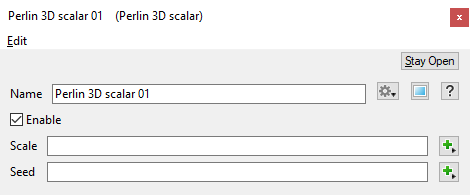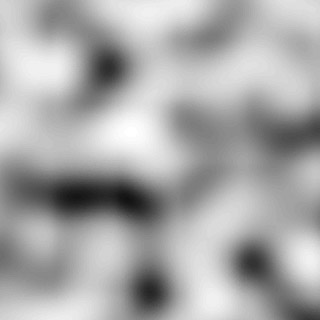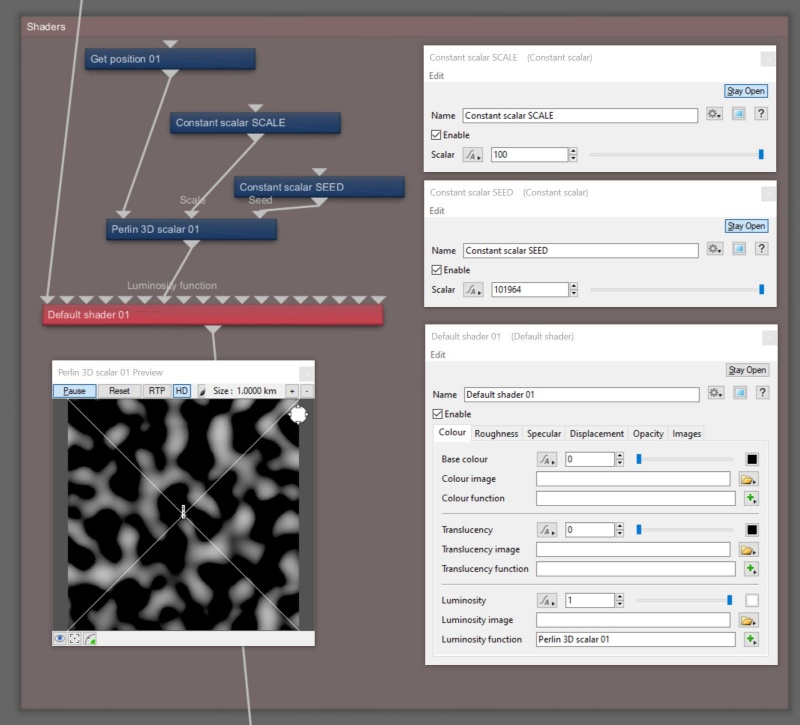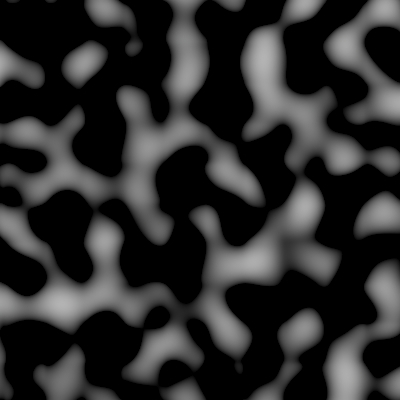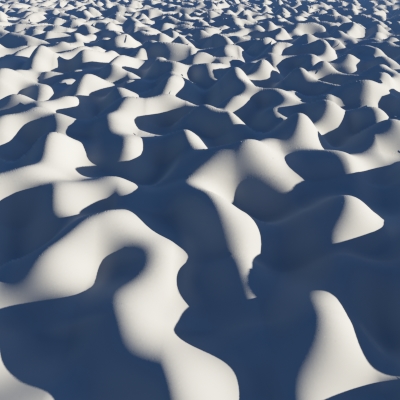Difference between revisions of "Perlin 3D Scalar"
(Updated descriptions and added example images.) |
|||
| Line 1: | Line 1: | ||
| − | + | <div style="float:right; border-style:solid; padding:20px"><categorytree mode=pages hideroot=off>Noise</categorytree></div> | |
| − | + | [[File:Perlin3DScalar_00_GUI.png|none|470px|Perlin 3D Scalar]] | |
| − | |||
| − | + | ==Overview== | |
| + | This node generates Perlin noise and outputs the noise value as a scalar. The output value ranges between -0.5 and 0.5. | ||
| − | + | Here is an example of the noise pattern generated by the node. Please note that this image has been adjusted somewhat to make the pattern a bit clearer. | |
| − | |||
| − | <!-- | + | <!-- <div><center>[[Image:perlin_3d.jpg]]<br /> [Perlin 3D scalar noise]<br /></center></div> --> |
| + | [[Image:perlin_3d.jpg|none|Perlin 3D scalar noise]] | ||
| + | |||
| + | |||
| + | This node requires a Get position, Get position in geometry, or Get position in texture function node to be assigned to its Main input so that the current [[Render State]] knows where a sampled point is located in texture space. | ||
| + | [[File:Perlin3DScalar_01_Nodes.JPG|none|800px|Node Network view of Perlin 3D Scalar with required node for position in texture space, and optional nodes to drive scale and seed values.]] | ||
| + | |||
| + | {| | ||
| + | |- | ||
| + | | [[File:Perlin3DScalar_02_RenderNoise.jpg|none|400px|Rendered top view of Perlin 3D scalar noise pattern.]] || [[File:Perlin3DScalar_03_RenderNoise.jpg|none|400px|Rendered perspective view of the same Perlin 3D scalar noise patten used for displacment.]] | ||
| + | |} | ||
| + | |||
| + | |||
| + | '''Settings:''' | ||
| + | * '''Scale:''' This setting controls the overall scale of the noise pattern generated. Increasing the value results in a larger pattern overall. | ||
| + | * '''Seed:''' The setting controls the noise pattern generated. Each seed value generates a slightly different pattern. | ||
| + | |||
| + | |||
| + | <br /n> | ||
[[Category:Noise]] | [[Category:Noise]] | ||
Latest revision as of 23:28, 6 April 2022
Overview[edit]
This node generates Perlin noise and outputs the noise value as a scalar. The output value ranges between -0.5 and 0.5.
Here is an example of the noise pattern generated by the node. Please note that this image has been adjusted somewhat to make the pattern a bit clearer.
This node requires a Get position, Get position in geometry, or Get position in texture function node to be assigned to its Main input so that the current Render State knows where a sampled point is located in texture space.
Settings:
- Scale: This setting controls the overall scale of the noise pattern generated. Increasing the value results in a larger pattern overall.
- Seed: The setting controls the noise pattern generated. Each seed value generates a slightly different pattern.
A scalar is a single number. 1, 200.45, -45, -0.2 are all examples of scalar values.
A single object or device in the node network which generates or modifies data and may accept input data or create output data or both, depending on its function. Nodes usually have their own settings which control the data they create or how they modify data passing through them. Nodes are connected together in a network to perform work in a network-based user interface. In Terragen 2 nodes are connected together to describe a scene.
